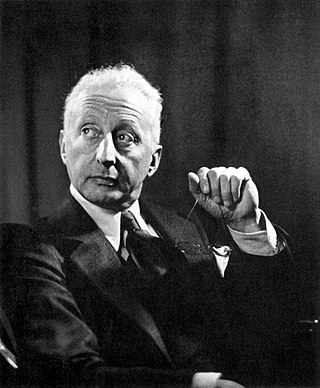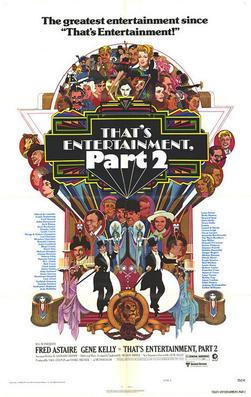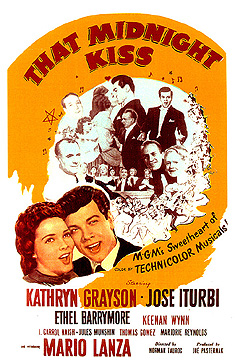
Jerome David Kern was an American composer of musical theatre and popular music. One of the most important American theatre composers of the early 20th century, he wrote more than 700 songs, used in over 100 stage works, including such classics as "Ol' Man River", "Can't Help Lovin' Dat Man", "A Fine Romance", "Smoke Gets in Your Eyes", "The Song Is You", "All the Things You Are", "The Way You Look Tonight" and "Long Ago ". He collaborated with many of the leading librettists and lyricists of his era, including George Grossmith Jr., Guy Bolton, P. G. Wodehouse, Otto Harbach, Oscar Hammerstein II, Dorothy Fields, Johnny Mercer, Ira Gershwin and Yip Harburg.

Otto Abels Harbach, born Otto Abels Hauerbach was an American lyricist and librettist of nearly 50 musical comedies and operettas. Harbach collaborated as lyricist or librettist with many of the leading Broadway composers of the early 20th century, including Jerome Kern, Louis Hirsch, Herbert Stothart, Vincent Youmans, George Gershwin, and Sigmund Romberg. Harbach believed that music, lyrics, and story should be closely connected, and, as Oscar Hammerstein II's mentor, he encouraged Hammerstein to write musicals in this manner. Harbach is considered one of the first great Broadway lyricists, and he helped raise the status of the lyricist in an age more concerned with music, spectacle, and stars. Some of his more famous lyrics are "Smoke Gets in Your Eyes", "Indian Love Call" and "Cuddle up a Little Closer, Lovey Mine".

Kathryn Grayson was an American actress and coloratura soprano.

That's Entertainment! is a 1974 American compilation film released by Metro-Goldwyn-Mayer to celebrate the studio's 50th anniversary. The success of the retrospective prompted a 1976 sequel, the related 1985 film That's Dancing!, and a third installment in 1994.

The Toast of New Orleans is a 1950 MGM musical film directed by Norman Taurog and choreographed by Eugene Loring. It stars Mario Lanza, Kathryn Grayson, David Niven, J. Carrol Naish, James Mitchell and Rita Moreno. The film was made after That Midnight Kiss, Lanza's successful film debut, as an opportunity for Lanza to sing on the big screen again.

Mario Lanza Live at the Hollywood Bowl: Historical Recordings is a 2000 CD, released by the Gala label, includes the six selections that tenor Mario Lanza sang at his first Hollywood Bowl concert on August 27, 1947. This is the performance that first brought Lanza to the attention of Hollywood, and shortly afterwards he was signed to a seven-year film contract with MGM. Included from the performance at the Bowl are six arias, three of them in duet with soprano Frances Yeend. Eugene Ormandy conducts the Hollywood Bowl Orchestra for these performances.
"So in Love" is a popular song, written by Cole Porter, from his musical Kiss Me, Kate, which was based on Shakespeare's The Taming of the Shrew. It was sung in the show by Patricia Morison, reprised by Alfred Drake, and further popularized by Patti Page in 1949.

That's Entertainment, Part II is a 1976 American compilation film released by Metro-Goldwyn-Mayer and a sequel to That's Entertainment! (1974). Like the previous film, That's Entertainment, Part II was a retrospective of famous films released by MGM from the 1930s to the 1950s. Some posters for the film use Part 2 rather than Part II in the title.

That Midnight Kiss is a 1949 Technicolor American musical romance film also starring Mario Lanza and Kathryn Grayson. Among the supporting cast were Ethel Barrymore, conductor/pianist Jose Iturbi, Keenan Wynn, J. Carrol Naish, and Jules Munshin. The commercially popular film was directed by Norman Taurog, who the following year would again direct Lanza and Grayson in the even more successful The Toast of New Orleans.
"Long Ago (and Far Away)" is a popular song with music by Jerome Kern, and lyrics about nostalgia by Ira Gershwin from the 1944 Technicolor film musical Cover Girl starring Rita Hayworth and Gene Kelly and released by Columbia Pictures. The song was nominated for the Academy Award for Best Original Song in 1944 but lost out to “Swinging on a Star”, from Going My Way. The song was published in 1944 and sold over 600,000 copies in sheet music in a year. In 2004 it finished #92 in AFI's 100 Years...100 Songs survey of top tunes in American cinema.

Till The Clouds Roll By is a 1946 American Technicolor musical film produced by Metro-Goldwyn-Mayer and a fictionalized biopic of composer Jerome Kern, portrayed by Robert Walker. Kern was involved with the production, but died before its completion. It was the first in a series of MGM biopics about Broadway composers.
"Without a Song" is a popular song composed by Vincent Youmans with lyrics later added by Billy Rose and Edward Eliscu, published in 1929. It was included in the musical play, Great Day. The play only ran for 36 performances but contained two songs which became famous, "Without a Song" and "Great Day".

Show Boat is a 1951 American musical romantic drama film, based on the 1927 stage musical of the same name by Jerome Kern (music) and Oscar Hammerstein II, and the 1926 novel by Edna Ferber. It was made by MGM, adapted for the screen by John Lee Mahin, produced by Arthur Freed and directed by George Sidney.

The Girl from Utah is an Edwardian musical comedy in two acts with music by Paul Rubens, and Sidney Jones, a book by James T. Tanner, and lyrics by Adrian Ross, Percy Greenbank and Rubens. The story concerns an American girl who runs away to London to avoid becoming a wealthy Mormon's newest wife. The Mormon follows her to England, but she is rescued from a bigamous marriage by a handsome actor.
"Make Believe" is a show tune from the 1927 Broadway musical Show Boat with music by Jerome Kern and lyrics by Oscar Hammerstein II.
"You Are Love" is a song by Jerome Kern and Oscar Hammerstein II from their classic 1927 musical play Show Boat. It is sung twice in the show - first, by Magnolia Hawks, the heroine, and riverboat gambler Gaylord Ravenal when they agree to marry near the end of Act I, and again in the penultimate scene of Act II by Ravenal when he returns to Magnolia after having deserted her for 23 years.

Michael Elder Rourke, who assumed the pen name Herbert Reynolds in 1913, was an Irish-American lyricist. Reynolds wrote the lyrics to Jerome Kern's first big hit, "They Didn't Believe Me", interpolated into the 1914 American version of The Girl from Utah, produced by Charles Frohman. The show had a successful run of 140 performances at the Knickerbocker Theatre, opening on August 14, 1914. Frohman had hired the young Kern to write five new songs for the score together with Reynolds to strengthen what he felt was a weak first act. Julia Sanderson and Donald Brian starred in the production.

Leave It to Jane is a musical in two acts, with music by Jerome Kern and book and lyrics by Guy Bolton and P. G. Wodehouse, based on the 1904 play The College Widow, by George Ade. The story concerns the football rivalry between Atwater College and Bingham College, and satirizes college life in a Midwestern U.S. town. A star halfback, Billy, forsakes his father's alma mater, Bingham, to play at Atwater, to be near the seductive Jane, the daughter of Atwater's president.
Miss 1917 is a musical revue with a book by Guy Bolton and P. G. Wodehouse, music by Victor Herbert, Jerome Kern and others, and lyrics by Harry B. Smith, Otto Harbach, Henry Blossom and others. Made up of a string of vignettes, the show features songs from such musicals as The Wizard of Oz, Three Twins, Babes in Toyland, Ziegfeld Follies and The Belle of New York.

Selections from Showboat is a Decca Records compilation album of phonograph records featuring songs from the Jerome Kern / Oscar Hammerstein II musical Show Boat.














